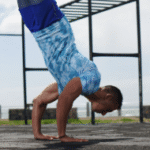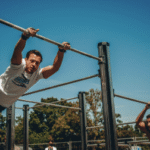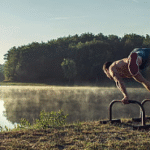Vetting Your Trainer: Ensuring Quality in Private Calisthenics
Why Vetting Matters in Calisthenics:
Calisthenics involves complex bodyweight movements, requires precise technique for safety and effectiveness, and often involves progressions that need expert guidance. A qualified trainer minimizes injury risk, accelerates progress, and provides proper programming. An unqualified one can lead to frustration, injury, and wasted investment.
**Step 1: Initial Online Research & Screening (The “Background Check”)**
Before even scheduling a call, do your homework online:
* **Review Their Website & Social Media:**
* **Professionalism:** Is the website/profile professional, clear, and easy to navigate?
* **Calisthenics Focus:** Do they clearly state a specialization in calisthenics? Look for content (blog posts, articles, videos, photos) demonstrating their knowledge and passion for bodyweight training. Does their content resonate with you?
* **About/Bio Section:** Read their background, philosophy, and experience.
* **Red Flags:** Watch out for overly aggressive sales language, guarantees of specific results (e.g., “master a handstand in 30 days guaranteed!”), lack of specific information, or unprofessional presentation.
* **Verify Credentials & Education:**
* **Baseline Certification:** At minimum, they should hold a reputable general Personal Trainer certification accredited by NCCA (e.g., NASM, ACE, NSCA, ACSM). This shows foundational knowledge.
* **Calisthenics-Specific Training:** **Crucially,** look for *additional* qualifications relevant to bodyweight training. This could include:
* Workshops or certifications from recognized calisthenics organizations (e.g., Progressive Calisthenics Certification – PCC, StrongFirst Bodyweight – SFB, World Calisthenics Organization – WCO workshops).
* Relevant degrees (Kinesiology, Exercise Science, Physical Therapy).
* Significant, verifiable coaching experience specifically in calisthenics/gymnastics.
* **Verification:** Don’t just take their word for it. Reputable certifications can often be verified online through the certifying body’s registry. Be wary of obscure or unaccredited “certifications.”
* **Check Online Reviews & Reputation:**
* Search their name and business name on Google, Yelp, Facebook, and potentially trainer directory sites (like FitnessTrainer.com or Thumbtack if they are listed there).
* Look for detailed reviews from past clients. Are there consistent themes (positive or negative)? Pay attention to comments about their knowledge, communication, professionalism, and client results specifically related to calisthenics.
**Step 2: The Consultation/Interview (Direct Assessment)**
This is your chance to gauge their expertise and personality directly. Prepare your questions (referencing our previous discussion on essential questions helps!):
* **Assess Their Experience with *Your* Needs:** Ask detailed questions about their track record helping clients with *your specific goals* (be precise – e.g., “building strength for first pull-up,” “improving handstand consistency,” “using calisthenics for weight loss”) and at *your current fitness level*.
* **Understand Their Methodology:**
* “How do you assess new clients?”
* “Can you describe your approach to programming calisthenics progressions?”
* “How do you incorporate principles of progressive overload with bodyweight exercises?”
* “How do you ensure proper technique and safety, especially for exercises like inversions or levers?”
* “How do you handle training plateaus?”
* **Evaluate Communication & Teaching Style:**
* Are their explanations clear and easy to understand?
* Do they listen actively to your questions and concerns?
* Do they ask insightful questions about *you*?
* Do you feel they could effectively teach *you* complex movements?
* **Gauge Professionalism & Personality:**
* Were they punctual and prepared for the consultation?
* Are their policies (scheduling, cancellation, payment) clear?
* Do you feel a comfortable rapport? Trust your intuition – you’ll be working closely together. Is their energy level and coaching style (e.g., encouraging, demanding, analytical) a good match for you?
* **Confirm Logistics & Insurance:** Double-check pricing, package details, session location, and critically, ask if they carry **professional liability insurance.** Reputable trainers always do.
**Step 3: Verify Proof of Results (See the Evidence)**
* **Ask for Examples/Case Studies:** Request specific, anonymized examples of how they helped clients achieve results similar to what you’re aiming for. What was the starting point, process, and outcome?
* **Review Their Portfolio:** Critically examine any before/after photos or videos they share (or have online). Look for good form in client demonstrations, realistic progress, and results relevant to calisthenics goals.
* **Consider Asking for References:** For a significant investment, it’s reasonable (though optional) to politely ask if they have 1-2 clients (with similar goals, and *only* with their explicit permission) you could briefly contact. A confident, established trainer may facilitate this.
**Step 4: The Trial Session (The “Test Drive”)**
* **Highly Recommended:** If feasible, book and pay for a single introductory or trial session before committing to a larger package. This is the single best way to:
* Experience their coaching style in action.
* Assess their cueing effectiveness and attention to detail.
* See how they manage safety protocols.
* Confirm if the personal connection feels right during an actual workout.
**Step 5: Trust Your Gut (The Final Check)**
* After gathering all objective information (credentials, experience, results, policies) and subjective impressions (communication, personality, trial session experience), step back and assess. Does this feel like the right partnership to help you achieve your goals safely and enjoyably?
**Quick Vetting Checklist – Key Qualities to Look For:**
* [ ] Deep Calisthenics Knowledge & Specialization
* [ ] Relevant, Proven Experience & Results
* [ ] Clear Communication & Effective Cueing
* [ ] Keen Eye for Technique & Detail
* [ ] Smart Programming & Adaptability
* [ ] Strong Emphasis on Safety
* [ ] Good Rapport & Personal Fit
* [ ] Professionalism (Insurance, Policies)
**Conclusion:**
Vetting a private calisthenics trainer is a crucial process that goes far beyond checking their availability and price. By systematically reviewing their credentials, experience, methodology, results, communication style, and professionalism through online research, targeted questions, and ideally a trial session, you can ensure you are choosing a high-quality coach. Investing this time upfront significantly increases your chances of having a safe, effective, and rewarding training experience that helps you truly achieve your calisthenics goals.

Vetting Your Trainer: Ensuring Quality in Private Calisthenics
Route
Calisthenics Gym Houston Functional Bodyweight Training
Secondary phone: (346) 483-3195
Email: info@calisthenicsclubhouston.com
URL: https://calisthenicsclubhouston.com/
Monday 6:00 AM - 7:00 PM Tuesday 6:00 AM - 7:00 PM Wednesday 6:00 AM - 7:00 PM Thursday 6:00 AM - 7:00 PM Friday 12:00 PM - 6:30 PM Saturday 9:45 AM - 12:00 PM Sunday 3:00 PM - 5:00 PM





